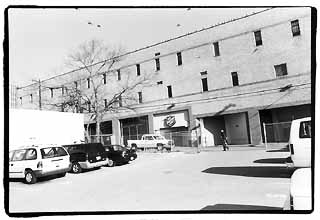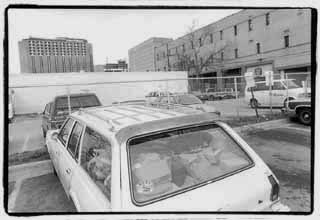The Human Element
By Bryan Mealer, Fri., Feb. 5, 1999
|
|
It's been nearly a year since Mayor Kirk Watson announced his $12.3 million homeless initiative for Austin and the downtown area, a plan that initially drew both praise and disdain from homeless support organizations and downtown business owners. While the plan is still the object of criticism from somedowntown businesses, city officials and advocates say the planning process is gaining momentum, and advisory groups for the project should have a list of recommended guidelines ready to submit to City Council by mid-February. The Homeless Self Sufficiency and Responsibility Initiative is one of the city's most ambitious endeavors yet in the social services area. On paper, the plan's goals are noble; they call for helping homeless individuals get off the streets, off drugs and alcohol, and assist them toward independent living. But the project's success depends on whether city officials and various downtown stakeholders can come to terms on the age-old issue of homelessness.
A key element of the plan is to use $1 million in city and federal funds to build a shelter for single "hard to serve" homeless men. Because construction is not expected to begin until late 2000, details are incomplete on the size and design of the new facility, which will be built on East Seventh Street between Neches and Red River. The nearby Salvation Army, owner of the property, will operate the new 80,000 square-foot, 250-bed shelter. The complex will also house a 11,000 square-foot clinic and resource center to assist with job training and placement, mental health care, and substance abuse treatment. Additionally, the Austin Resource Center for the Homeless (ARCH), which provides job placement, shower and laundry facilities, and other services for the homeless, is expected to relocate to the new facility when it's finished. Meanwhile, the city has promised to find an interim site for ARCH once it is forced out of its current location at 411 West Second Street -- the potential site of the Computer Sciences Corp./office complex.
Joyce Pohlman, homeless coordinator for the Austin/Travis County Health and Human Services Department, said designs for the shelter, as well as bidding for who will operate the clinic, are still in the planning stages. So far, St. David's Hospital and People's Clinic have both expressed interest in the project. Pohlman said two advisory groups -- comprised of representatives from neighborhood associations, downtown businesses, churches, and homeless and formerly homeless individuals -- are in the process of drafting their recommendations for final approval from City Council.
|
|
|"Right now we're at a point where we're looking at some of the tougher questions, like how to encourage people to use the shelter," said Pohlman. She said the group has been brainstorming ideas about the specifics of the shelter such as smoking policies, "lights out" periods, services that will be provided, and establishing a positive reputation on the streets. "I think we have the opportunity to make this a model both inside and outside the city," she said.
Eugene Golden, client service specialist at ARCH and member of one of the advisory groups, said talks are going better than they were during the initial stages of the project. He said that was partly because of ARCH's concerns about what would become of its program if the CSC complex is built. ARCH currently serves nearly 200 homeless people a day, and 2,500 "non-repeat" clients in a year. The mayor and CSC both sent ARCH a letter three weeks ago, saying that efforts to relocate the center will be a top priority.
"We need a center that will provide the same services we do now uninterrupted," said Golden, who was once homeless himself. "And wherever we are temporarily located, we don't want to be isolated to where it makes it difficult for us to be in mainstream society."
Less controversial aspects of the homeless package include:
- Two shelters for homeless women and children to be built in East Austin, one of which will be operated by SafePlace (formerly the Center for Battered Women), and another 50-unit apartment complex that will be located on the same land. Once the shelters are built, women and children will be moved from the Salvation Army and relocated to the new facilities. A spokesman for the Salvation Army said they will continue to serve women and children once the new facilities are built, but only on an emergency basis. To ensure safety to the shelter's clients, the city has asked that the exact locations of the women and children's shelters not be disclosed.
- A community court within the Austin Municipal Court that will enforce stiffer penalties for repeat Class C misdemeanors, such as urinating in public, panhandling, possession of drug paraphernalia, public intoxication, and public camping. The court is designed to stop the revolving door of repeat offenders who cause headaches for officers who spend hours filing arrests only to see offenders released a short time later. Through the court, which is modeled on similar courts in Manhattan, Baltimore, and Atlanta, repeat offenders will be given options such as substance abuse treatment or community service, in order to reduce their time in jail. Currently, the fine for a Class C misdemeanor is $500 or jail time if the fine cannot be paid.
In the meantime, the proposed East Seventh shelter continues to draw criticism from members of the East Sixth Street Community Association (ESSCA), who are worried that an all-men's shelter will only increase the number of aggressive panhandlers downtown while causing property values to decrease. Bob Woody, president of ESSCA and owner of several downtown businesses, has called the shelter "shortsighted" and "ill-planned," especially since the city is trying to increase tourism in the area with projects like the Waller Creek River Walk and the expansion of the Austin Convention Center.
Carl Daywood, whose East Seventh Street real estate office is a block from the proposed location, thinks that the plan's main shortcoming -- besides it being a block from his business -- is the lack of detoxification services for alcohol and drug abusers. He said the only way to truly integrate people back into society is through brass-tacks rehabilitation and the desire of those individuals to get off the streets. "Sure, I want to help these people, too, but I don't have faith the city can do what they've set out to do," said Daywood. "I'm not sure [the shelter] will provide adequate services."
Pohlman said the city has budgeted $400,000 for detox programs and is seeking out existing agencies to provide rehabilitiation services at their own facilities. She said the skepticism is due to the absence of a plan to erect a building specifically designated for detox, but such a facility would probably not be welcomed downtown anyway. "When you don't have a physical facility designated, people don't think it's real," she said. "But it's real."
Salvation Army representative Dick Rathgeber said it would be impossible to please everyone involved, and locating the shelter near already existing service facilities only makes sense. "This is the only place a shelter can go without raising a firestorm of protest," he said. "Some people in this city would like to see them somewhere between Midland and Marathon."
Got something to say on the subject? Send a letter to the editor.








